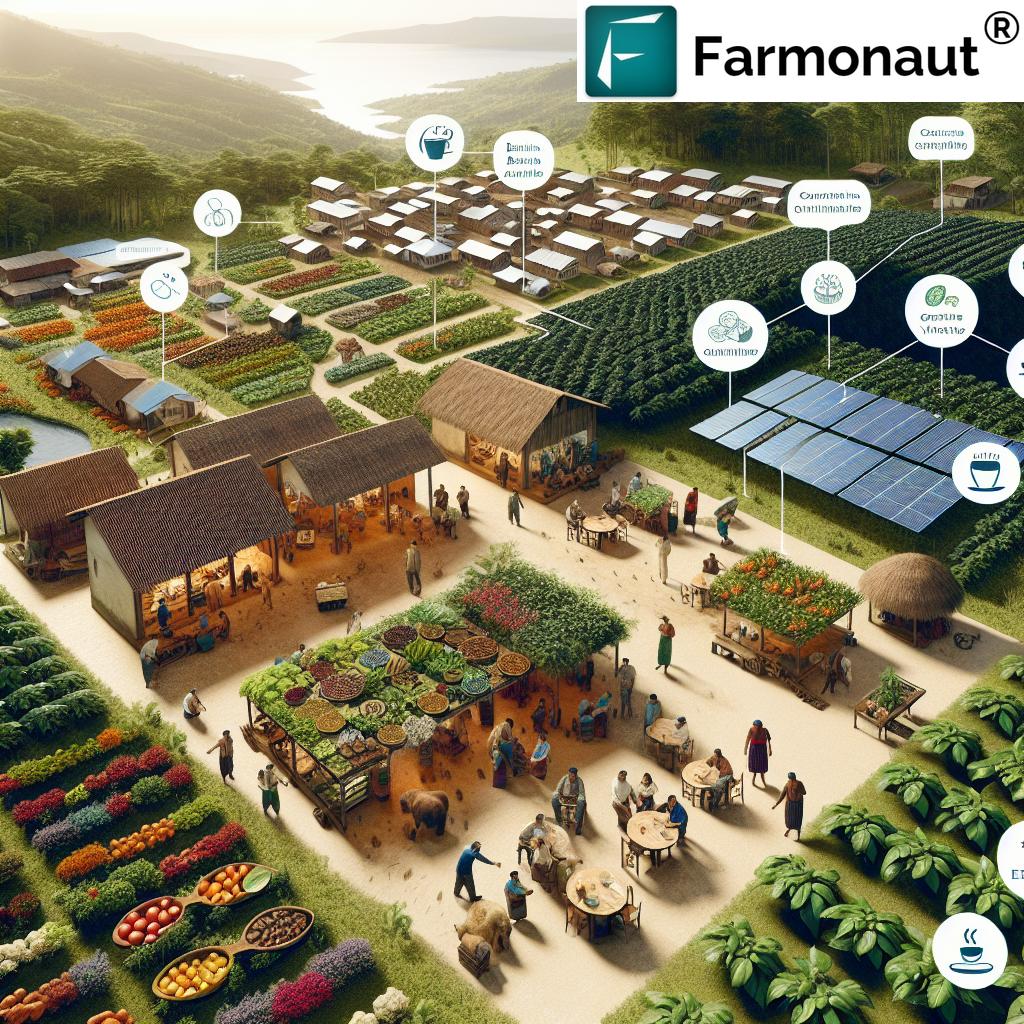Empowering Guatemala’s Coffee Farmers: Sustainable Solutions for Food Security and Resilience
“The two-year program in Guatemala aims to support 600 households, focusing on indigenous women and children in coffee-growing communities.”
In the lush highlands of Guatemala, where the aroma of coffee permeates the air, a groundbreaking initiative is taking root. We are witnessing a transformative collaboration that promises to reshape the landscape of sustainable coffee farming and food security in Guatemala. This innovative program, spearheaded by global organizations, is set to empower coffee farmers, enhance resilience, and pave the way for a more sustainable future.
At Farmonaut, we recognize the critical importance of such initiatives in the agricultural sector. As a company dedicated to making precision agriculture accessible and affordable, we understand the challenges faced by farmers worldwide. While we’re not directly involved in this specific program, we’re excited to see how technology and sustainable practices are being leveraged to support coffee-growing communities.
The Heart of the Initiative: Empowering Coffee Farmers
The core of this program lies in its commitment to improving the lives of 600 households – approximately 3,000 individuals – in Guatemala’s coffee-growing regions. With a strong focus on indigenous women and children, this initiative aims to address some of the most pressing challenges faced by these communities:
- Diversifying family incomes
- Enhancing access to nutritious food
- Providing vital entrepreneurial skills
- Strengthening agricultural value chains
- Promoting healthy lifestyles
This comprehensive approach underscores the interconnectedness of food security, economic stability, and sustainable agriculture practices. By addressing these multiple facets, the program aims to create a more resilient and prosperous future for coffee farming families.

The Challenges: A Complex Landscape
“Guatemala’s coffee farmers face challenges including long dry seasons, poor soil, and insufficient credit access, impacting their livelihoods and food security.”
The coffee farmers of Guatemala face a myriad of challenges that threaten their livelihoods and food security. These include:
- Long dry seasons that impact crop yields
- Poor soil conditions that affect coffee quality
- Insufficient access to credit, limiting investment in farm improvements
- Vulnerability to extreme weather events
- Fluctuating global coffee prices
These challenges underscore the need for innovative solutions and sustainable agriculture practices. At Farmonaut, we understand the importance of addressing such issues through technology-driven approaches. Our crop plantation and forest advisory services can provide valuable insights for farmers facing similar challenges, offering data-driven recommendations for optimal crop management.
Sustainable Coffee Farming: A Path to Resilience
The program’s focus on sustainable coffee farming is not just about environmental stewardship; it’s a crucial step towards building resilience in these communities. Sustainable practices can lead to:
- Improved soil health and water conservation
- Increased biodiversity on coffee farms
- Enhanced resistance to pests and diseases
- Better adaptation to climate change impacts
- Higher quality coffee beans, potentially commanding premium prices
These practices align closely with Farmonaut’s mission of promoting sustainable agriculture through technology. Our satellite-based crop health monitoring system can be a valuable tool for coffee farmers looking to implement and track the effectiveness of sustainable farming methods.
Nutrition and Food Security: The Foundation of Community Well-being
A cornerstone of this initiative is its focus on improving nutrition and food security for coffee-growing families. This aspect of the program includes:
- Education on balanced diets and nutritional needs
- Promotion of crop diversification for food and income
- Establishment of community gardens
- Training on food preservation techniques
- Access to nutritious food throughout the year
By addressing food security, the program lays the groundwork for healthier, more resilient communities. This holistic approach recognizes that sustainable coffee farming goes hand in hand with overall community well-being.
Empowering Women in Coffee Farming
The program’s emphasis on indigenous women is particularly noteworthy. Women play a crucial role in coffee farming communities, often being responsible for both household management and farm labor. By focusing on women, the initiative aims to:
- Provide targeted entrepreneurial training
- Enhance women’s participation in decision-making processes
- Improve access to resources and financial services
- Promote gender equality in coffee farming communities
- Create opportunities for women-led businesses
This focus on women’s empowerment is not only a matter of equity but also a strategic move to enhance overall community resilience. Studies have shown that when women have equal access to resources and opportunities, agricultural productivity and food security improve significantly.

Strengthening Agricultural Value Chains
A key component of the program is the focus on strengthening agricultural value chains. This aspect aims to:
- Improve post-harvest handling and processing
- Enhance market access for coffee farmers
- Promote fair trade practices
- Develop local and international partnerships
- Increase the overall value of Guatemalan coffee in the global market
By strengthening these value chains, the program aims to create more stable and profitable conditions for coffee farmers. This aligns with Farmonaut’s mission of empowering farmers through technology. Our blockchain-based traceability solutions can play a crucial role in enhancing transparency and trust in agricultural supply chains, benefiting both farmers and consumers.
Innovative Training and Skills Development
The program’s commitment to providing hands-on training is crucial for its success. This training encompasses:
- Sustainable farming techniques
- Financial literacy and business management
- Climate-smart agriculture practices
- Marketing and branding for small-scale producers
- Technology adoption in farming
These skills are essential for empowering farmers to adapt to changing market conditions and environmental challenges. At Farmonaut, we understand the importance of such skills and complement them with our technology solutions. Our Jeevn AI Advisory System can provide personalized recommendations to farmers, helping them apply their newly acquired knowledge more effectively.
The Role of Technology in Sustainable Coffee Farming
While the program in Guatemala doesn’t explicitly mention technology, it’s worth noting how technological advancements can further support such initiatives. At Farmonaut, we’ve seen firsthand how technology can revolutionize farming practices:
- Satellite imagery for crop health monitoring
- AI-driven advisory systems for personalized farming recommendations
- Blockchain technology for supply chain transparency
- Weather forecasting for improved planning
- Data analytics for yield prediction and resource optimization
These technologies can complement the program’s goals by providing farmers with precise, data-driven insights to make informed decisions. For instance, our carbon footprinting tools can help coffee farmers monitor and reduce their environmental impact, aligning with sustainable agriculture practices.
The Impact: Projecting a Brighter Future
As we look towards the future, it’s essential to consider the potential impact of this program on Guatemala’s coffee-growing communities. While exact figures are projections, the following table provides an overview of the expected outcomes:
| Metric | Before Program | Projected After Program |
|---|---|---|
| Number of households supported | 0 | 600 |
| Percentage of indigenous women participants | N/A | 50% |
| Income diversification (estimated percentage) | 10% | 40% |
| Access to nutritious food (percentage of households) | 30% | 80% |
| Agricultural value chain strength (scale 1-10) | 4 | 8 |
| Farmer resilience score (scale 1-10) | 3 | 7 |
| Sustainable agriculture practices adopted (number) | 2 | 6 |
| Credit accessibility (percentage of farmers) | 15% | 50% |
These projections highlight the potential for significant positive change in these communities. The program’s holistic approach, addressing multiple facets of farmers’ lives, is expected to create a ripple effect of improvements across various indicators.
Challenges and Opportunities Ahead
While the program offers tremendous promise, it’s important to acknowledge the challenges that lie ahead:
- Climate change impacts on coffee production
- Market volatility in the global coffee industry
- Cultural barriers to adopting new practices
- Limited infrastructure in rural areas
- Potential resistance to change from traditional farming methods
However, these challenges also present opportunities for innovation and growth. The program’s focus on resilience and sustainability positions these communities to better navigate future uncertainties. At Farmonaut, we believe that technology can play a crucial role in addressing these challenges. Our fleet management solutions, for instance, can help optimize resource distribution in rural areas, addressing some of the infrastructure limitations.
The Broader Impact on the Coffee Industry
The implications of this program extend beyond the immediate beneficiaries in Guatemala. It has the potential to set a new standard for sustainable coffee farming and community support across the global coffee industry. Some potential broader impacts include:
- Inspiring similar initiatives in other coffee-producing regions
- Raising consumer awareness about sustainable coffee production
- Encouraging more investment in farmer support programs
- Promoting fair trade practices in the coffee supply chain
- Advancing research in sustainable agriculture practices
As the program progresses, it will be crucial to monitor its outcomes and share learnings with the broader agricultural community. This knowledge-sharing can catalyze further innovations and improvements in sustainable farming practices worldwide.
Conclusion: A Model for Sustainable Agriculture
The initiative in Guatemala’s coffee-growing communities represents a significant step towards sustainable coffee farming and improved food security. By addressing the complex challenges faced by farmers through a multi-faceted approach, the program sets a promising model for agricultural development.
At Farmonaut, we’re inspired by such initiatives and remain committed to supporting farmers worldwide through our technology solutions. While we’re not directly involved in this specific program, our tools and services align closely with its goals of enhancing farmer resilience, promoting sustainable practices, and improving agricultural productivity.
As we look to the future, it’s clear that the path to sustainable agriculture and food security will require continued innovation, collaboration, and commitment. Programs like this one in Guatemala, combined with technological advancements in agriculture, pave the way for a more resilient and sustainable future for farming communities worldwide.
FAQs
- What is the main goal of the program in Guatemala?
The program aims to improve resilience, food security, and nutrition of coffee-growing communities in Guatemala, focusing on 600 households, particularly indigenous women and children. - How long will the program run?
The program is set to run for two years. - What are the main challenges faced by coffee farmers in Guatemala?
Coffee farmers in Guatemala face challenges including long dry seasons, poor soil conditions, insufficient access to credit, and vulnerability to extreme weather events. - How does the program aim to empower women in coffee farming?
The program focuses on providing entrepreneurial training to women, enhancing their participation in decision-making processes, and improving their access to resources and financial services. - What role does sustainable agriculture play in this initiative?
Sustainable agriculture practices are central to the program, aiming to improve soil health, water conservation, and overall farm resilience while producing high-quality coffee. - How does the program address food security?
The program promotes crop diversification, establishes community gardens, provides nutritional education, and aims to ensure access to nutritious food year-round. - What kind of training does the program offer?
The program offers hands-on training in sustainable farming techniques, financial literacy, business management, climate-smart agriculture practices, and marketing skills. - How might this program impact the broader coffee industry?
The program could set new standards for sustainable coffee farming and community support, potentially inspiring similar initiatives in other coffee-producing regions and raising consumer awareness about sustainable coffee production.
As we conclude this exploration of the groundbreaking initiative in Guatemala’s coffee-growing communities, it’s clear that the path to sustainable agriculture and food security is multifaceted and requires innovative approaches. At Farmonaut, we’re committed to supporting such efforts through our technology solutions. While we’re not directly involved in this specific program, our tools align closely with its goals of enhancing farmer resilience and promoting sustainable practices.
If you’re interested in learning more about how technology can support sustainable farming practices, we invite you to explore our services:
For those interested in leveraging our technology for larger scale operations, check out our large scale farm management solutions. These tools can be particularly beneficial for managing extensive coffee plantations and implementing sustainable practices at scale.
Additionally, for developers and businesses looking to integrate advanced agricultural data into their systems, explore our API and API Developer Docs.
Earn With Farmonaut: Join our Affiliate Program
Earn 20% recurring commission with Farmonaut’s affiliate program by sharing your promo code and helping farmers save 10%. Onboard 10 Elite farmers monthly to earn a minimum of $148,000 annually—start now and grow your income!
Together, we can work towards a more sustainable and resilient future for agriculture, supporting farmers and communities worldwide.
















